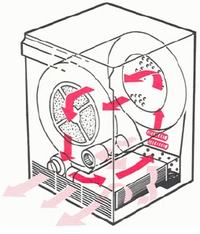I have a heat pump dryer, the hanging dryer went to the trash. I cannot imagine any other drying method. I sincerely recommend. Each laundry ends up in the dryer.

Czy wolisz polską wersję strony elektroda?
Nie, dziękuję Przekieruj mnie tamlevy^ wrote:About half a year ago I made such a comparison based on the instructions for the devices and it turned out that the pump dries longer.And here I will surprise you because drying in a heat pump dryer takes less time than in a convection dryer
Jericho24 wrote:About half a year ago I made such a comparison based on the instructions for the devices and it turned out that the pump dries longer.
barti44 wrote:I bought without a heat pump, Bosch BOSCH WTG 86400 PL for PLN 1700. I'm very happy. Interesting facts - the device heats up, both side walls and the back are warm, heats up the room, but not to the extent of discomfort.
When I washed the heat exchanger after 8 drying cycles, I understood why the device with the heat pump will work less and less. There was a whole lot of dust of all kinds.
The dryer itself is very pleasant to interact with, neatly made, does not seem cheesy.
cezaarr wrote:Condenser dryers with an electric heater and a heat pump do not use water for cooling. Water for cooling is used by washer-dryers (I am not sure if all models are also available).only the cost of the water used for drying remains.
barti44 wrote:Maras77, great matching!
One question - you wrote that "For dryers with a heater, the ambient temperature and the size of the room where it stands are important" - why? It seemed to me that with such a simple exchanger it does not matter.

Arbiter wrote:And just - I thought, and probably the one with the pump, since it consumes 1.2kwh, it gives so much to the environment because the principle of energy conservation must be kept
this would mean that the room with the pump heats up slightly less than the condensing one. I think right? that is, all the advantages of the advertising of pump-dryers become only advantages on paper
freebsd wrote:@ maras77 What power are you thinking of?
My dryer (with electric heater) uses an average of 1.62 kWh for the entire drying cycle, usually up to 90 minutes.
estor wrote:Does anyone know this electrolux? It has a lot of good reviews in stores, but with opinions differently
